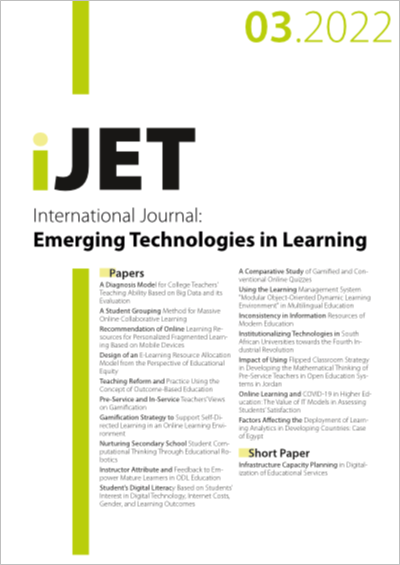Using the Learning Management System "Modular Object-Oriented Dynamic Learning Environment" in Multilingual Education
DOI:
https://doi.org/10.3991/ijet.v17i03.25851Keywords:
distance learning, LMS MOODLE, multilingual learning, online educational platforms, semantic differential methodAbstract
The article aims to study the possibilities, identify features, and assess the prospects for using the LMS MOODLE system (learning management system "Modular Object-Oriented Dynamic Learning Environment") for the formation of language skills in multilingual education. The study involved two groups of respondents, comparable in gender and age: 112 linguistic students (group A) and 109 non-linguistic students studying several foreign languages (group B). The respondents' answers to the questions of a specially developed questionnaire were analyzed, which made it possible to compare the parameters of training using the LMS MOODLE platform and traditional classroom training. To determine the connotative (individual-value) attitude towards obtaining multilingual education using the LMS MOODLE platform and to identify its subjective-personal meaning, Ch. Osgood's semantic differential method was used on the basis of a seven-point bipolar scale. Linguistic and non-linguistic students assessed differently LMS MOODLE platform for multilingual education, which is associated with different motives for acquiring multilingual competence and its professional significance.
Downloads
Published
2022-02-18
How to Cite
Qin, S., Orchakova, L., Liu, Z.-Y., Smirnova, Y., & Tokareva, E. (2022). Using the Learning Management System "Modular Object-Oriented Dynamic Learning Environment" in Multilingual Education. International Journal of Emerging Technologies in Learning (iJET), 17(03), pp. 173–191. https://doi.org/10.3991/ijet.v17i03.25851
Issue
Section
Papers
License
Copyright (c) 2022 Si Qin, Larisa Orchakova, Zi-Yu Liu, Yulia Smirnova, Elena Tokareva

This work is licensed under a Creative Commons Attribution 4.0 International License.



